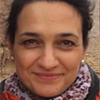


Select one of the options below:
This course explores how:
ANTH 100 (Introduction to Cultural Anthropology) or ANTH 200 (Cultures and the Global System)
Please check the CSU Bookstore for textbook information. Textbook listings are available at the CSU Bookstore about 3 weeks prior to the start of the term.

9703109137 | teresa.tellechea@colostate.edu
Dr. Teresa Tellechea is a Cultural Anthropologist originally from Madrid, Spain, where she completed her BA in Philosophy and Ph.D. in Socio-Cultural Anthropology at Autonomous University of Madrid. She completed her doctoral coursework and research at CU Boulder for her dissertation on the intercultural aspects of disability in the United States. She has spent more than twenty years applying ethnographic tools to issues in different fields, including public and mental health, agriculture, criminal justice, education, and foreign affairs. She enjoys bringing her professional experience to her classes in the Anthropology Department. Dr. Tellechea’s applied work has focused on the socio-cultural dimensions of health disparities, human rights, and social injustice faced by minoritized groups. She has a keen interest in social documentary, having worked on visual ethnographic projects for State Department-sponsored Young Iraqi Leadership Program, West Bank Refugee Camp project through United Nations, and freelance work on the front lines of the Balkan War. Before a brief return to Colorado, Dr. Tellechea advised U.S. Embassy officials in identifying and understanding political, religious, and civil society trends and developments in Sri Lanka and the Maldives. Afterward, she worked in Saudi Arabia for two years where she co-founded the Saudi Women Intercultural Networking Group dedicated to connecting Saudi women with non-Saudi women through art and culture. Subsequently, Dr. Tellechea moved to Perú where she collaborated with a non-profit organization focused on indigenous communities in the Peruvian Amazon region. She was also involved in ensuring U.S. citizens incarcerated in Lima were treated in accordance with international human rights conventions. She is temporarily residing in Washington, DC preparing for her next endeavor in Nicaragua.